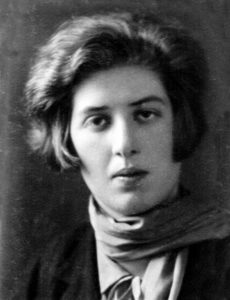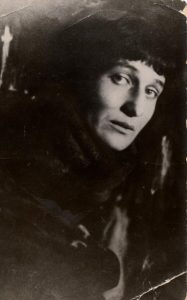Words on the Word
Baptism of the Lord
Isaiah 42:1-4, 6-7: He does not shout aloud.
Acts 10:34-38: God sent his word to the people of Israel.
Matthew 3:13-17: A voice spoke from heaven, ‘This is my Son, the Beloved.’
On the train last night, chugging across the mountains of Dovre in pitch darkness, I read Lydia Chukovskaya’s account of her first visit to the poet Anna Akhmatova. It took place in 1938. Stalin was the declared enemy of both. Chukovskaya’s husband and Akhmatova’s son were in gaol. The women knew they too risked arrest — or worse. Chukovskaya had come to ask her older, revered colleague for advice. But they also spoke, in whispers, of what was, for both of them, the heart of existence: poetry, the articulation of experience. Akhmatova read aloud one of her poems. At that time she hardly wrote anything down, it was too dangerous. Her poems lives only in her memory and in that of trusted friends. This is how Chukovskaya describes her journey home through Leningrad that evening:

I left late. I walked through the darkness repeating her verses. It was indispensable that I remember them all at once, from the first to the last; from then on I couldn’t separate myself from them even for an instant. When something escaped me, I put words of my own in to keep the rhythm. In response, from the depth of my remembrance, these replacement words called forth the right ones. I managed to reconstitute everything. On the other hand, while I washed and undressed before going to bed I was unable to remember a single one of my steps along the way. How had I crossed the courtyard of the House of Recreational Science? And the Nevski Prospekt? I had walked like a sleepwalker. But instead of the moon, poetry had guided me, and the world was absent.
I believe we have all had experiences of this kind. Chukovskaya’s account at once made me think of yesterday’s collect, which goes like this: ‘Lord, may the radiance of your glory light up our hearts and bring us through the shadows of this world until we reach our homeland of everlasting light.’
Our lives can at times resemble a long walk through the night. We need a light to steer by. We tend to seek that light outside ourselves. That isn’t daft. But it isn’t enough to follow pre-illumined paths. In addition we need a light from within that gives us courage to keep walking, that lets use see that our journey has a purpose and tends towards a goal. We must rise, then, to a level beyond that of street lamps. We need the radiancy of poetry.
When I speak of poetry I do not primarily think of pretty verses about flowers, keeping a regular rhythm and end-rhymes. I envisage the poem as an inspired statement of what, otherwise, remains ineffable. A poem expresses something we know but haven’t been able to put into words. In our second reading Peter claims the word and says: ‘God sent his Word to the people of Israel.’ he sent the Word, not as a coded message, but as an embodied presence. One possible way of thinking of Jesus is to see him as a poem in flesh and blood, a poem revealing the sense of our lives beautifully.

Today we remember the baptism of Jesus not primarily as a happening alongside other happenings, but as the epiphany of the sense of the Lord’s being and action. Are we to grasp what his baptism represents, we must approach it poetically. We must consider every aspect of the Gospel — each word, each syllable — in the light of a meaningful, complex context. If we do, a wide perspective opens.
When Jesus descends into the water, he touches creation as such. Modern environmental politics proclaim the same message as the beginning of the book of Genesis: No water, no life. He, the Holy One, hallows creation and claims it for himself. From this moment on, creation is a means to our hallowing. We ascertain this in the way we use water, oil, bread, and wine. Thus Jesus’s baptism stands for a horizontal axis, affirming his communion with the things of earth. This horizontal picture is rent by a vertical axis intruding in the form of the descending Dove, a herold of the Father’s voice proclaiming: ‘My Son, the Beloved!’ Love is revealed by the fact that the Son stands undressed and vulnerable as the axes’ point of intersection. The Baptism indicates a cruciform pattern that will be revealed definitively on Calvary. Let us be mindful of that when we recall that we have been baptised ‘into Christ’s death’ (Rm 6:3) in order to rise to new life in him.
The Spirit hovering over the water makes us think of the first day of creation. Something entirely new is about to begin. This new thing holds out the key to our life’s enigma. The baggage the old Adam has lugged around for so long is taken by the current; while the new Adam rises, upright and free, to be showered with divine love. Christ, the Firstborn, shows us what we, God’s adopted children, are called to become.
This image — or, if you like, this poem — gives meaning to everything else.
This is what we must keep in mind, then, on our journey through the night. Let us, like Chukovskaya, say to yourselves: ‘I must keep these words; I can’t separate myself from them for an instant.’ What she remembered was a poem of this world. What we are asked to remember is the poem of eternity, a revelation.
Our time is unbelievable complex. The earth’s destiny seems to be surrendered to microelectronics, quantum information systems, and artificial intelligence, processes that for most of us are unintelligible. Because we can’t understand we feel powerless; and because we feel powerless we are frightened. We need another light by which to orient ourselves. That light has been given us in the Word made flesh. If we learn the Word’s words by heart and make them our own, they will lead us though the chaos of darkness. Thus we shall be brought home safely, even though we may not be able to say exactly how, or by what path, we found our way to our Father’s house. Amen.
